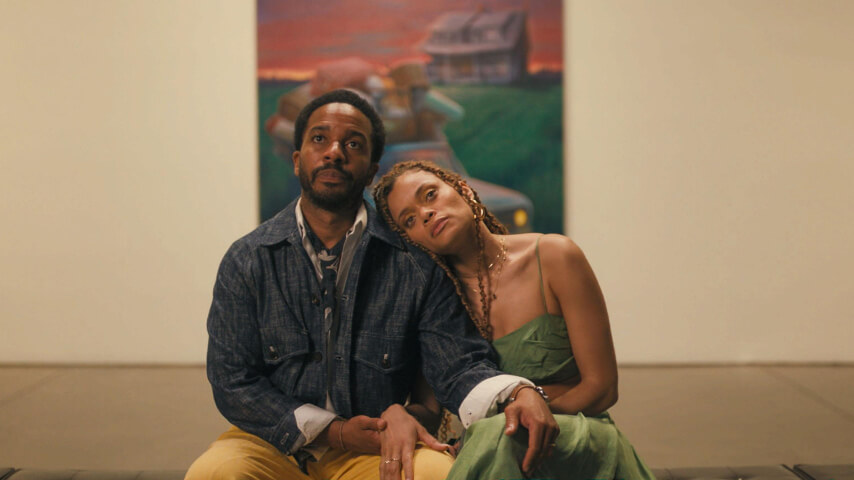The way these women become tools for Tarrell and La’Ron’s use in tinkering with their relationship is representative of the storytelling traps Exhibiting Forgiveness falls into after its elegant opening. Its dramatic beats are stilted, dialogue splashing us with emotions already bright as day, while so much of the bad-dad relationship feels as cheap and thin as its supporting characters. The more moving moments occur when the structure shakes free of the prickly reconciliation formula. Contained, well-observed flashbacks and low-key setpieces (like an interview between Tarrell and La’Ron that feels more like an interrogation) take the requisite time to develop the characters, trusting in the cast to maintain the emotional throughline beyond the simple bounds of linear storytelling. In the latter example, Jelks recounts a tragic monologue with the painful amusement of old age. The actor brings a surprising, vital energy to a weepy confession that is made all the better by its inventive visual framing.
Kaphar (best known as a painter, whose own works stand in as Tarrell’s) is a stunning stylist, even when his writing fails to keep up with the honesty of his images. When the heavy needs of the narrative fade into the background, Kaphar’s tactility and compositional sense thrive. His appreciation for rough fabric, oil paint, and the actual act of painting translates into the most inviting and visually arresting sequences in the film. Compare these to every writing scene in a movie about writers; nothing is more boring than watching someone sit at a desk, crossing ideas off a notepad. Kaphar instead puts us in Tarrell’s head by teasing our senses with what it’s like in his studio. And the colors! Red brick, blue hair, blood on white tube socks and Converse high-tops. Cinematographer Lachlan Milne (Minari) clicks nicely into place with Kaphar, keeping the more mundane moments just as pretty and bold as the ones hanging on the wall. Complementing Kaphar’s colorful palette, close-ups of process, and naturally filled frames is Holland’s perseverant, indignant performance.
Tarrell is resolute that he will not become his father, though the way he’s processing his issues is clearly heading towards combustion. For every soft moment where he emphatically forges a healthy connection with his own young son (charmingly, they bond over movies like The Godfather), there’s a conversation with his father as raw as an open wound. Kaphar juxtaposes these generations well, but it’s Holland’s layered sincerity that sells this imperfect refusal to repeat the past. Holland is a master of head tilts, of smirks, of scabbed-over pain and smugness and anger. When Holland is communicating so much hurt already, the film’s overwrought confrontations feel even more egregious. There’s a lived-in chemistry between the whole cast that the script can’t match, but it does mean that even the clumsy moments are navigated with the casualness of real people. Some scenes are overblown, but only one (a final moment at Tarrell’s art show) ever feels false.
As loud and blunt as Kaphar’s truth sometimes is in Exhibiting Forgiveness, its vibrant packaging makes it as palatable as its performers make it convincing. Holland’s uneasiness slices through the simple framework like one of the script’s most cutting (and perhaps personal) remarks, spat out in the midst of a conflict: “I know you’d rather be painting right now.” The allure of that easy escape—because that’s what it is, even if it’s a healthier retreat than turning to substances—is constant, this desire for some kind of out bridging the gap between the film’s men and speaking to a universal anxiety about one’s own abilities to cope. That the film never offers a magical cure for that anxiety keeps us invested in its layered mural.
Director: Titus Kaphar
Writer: Titus Kaphar
Starring: André Holland, John Earl Jelks, Andra Day, Aunjanue Ellis-Taylor
Release Date: October 18, 2024









































